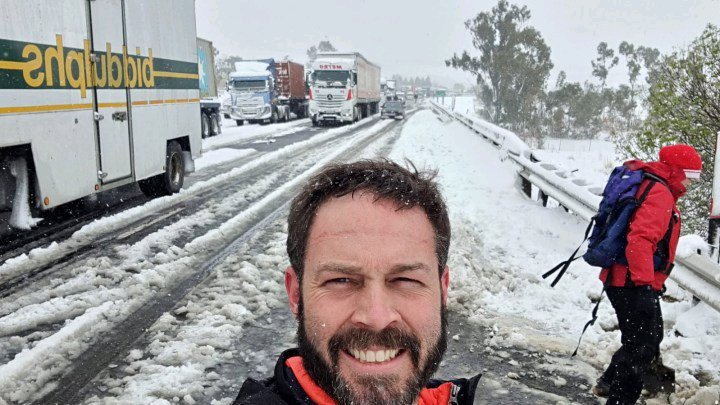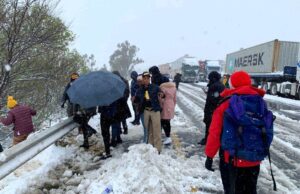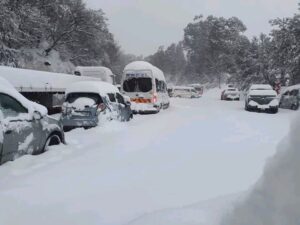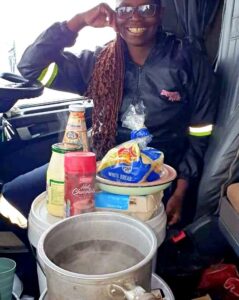
Over the weekend, South Africa’s coastal regions were struck by unseasonably heavy snowstorms of an intensity and scale rarely seen in the area, resulting in two tragic fatalities and significant disruption. The unexpected storms left many stranded and forced emergency services into action.

The two fatalities, attributed to hypothermia, occurred when individuals became trapped in vehicles immobilized by the relentless snowfall on the N3 highway. One of the victims was a 39-year-old woman traveling in a minibus, illustrating the peril faced by those unprepared for such severe weather conditions. The sheer volume of snow, combined with icy conditions and drastically reduced visibility, rendered many highways impassable, leaving motorists stuck for over 12 hours.
Emergency services responded quickly, working tirelessly to clear the affected roads. Crews towed dozens of trucks and other vehicles from snowdrifts, while teams distributed essential supplies like food and warm beverages to those left shivering in their cars. The operation was extensive, with rescue workers braving the elements to assist those in dire need. Motorists in areas that were subsequently cleared were urged to exercise caution due to lingering icy patches and snow hazards.


The impact of the snowstorms reached far beyond just the highways. In KwaZulu-Natal, schools were closed as a precautionary measure, with Provincial Minister for Cooperative Governance, Thulasizwe Buthelezi, warning about the potential for flooding as the snow began to melt. “As schools remain closed, parents are urged to keep children away from unguarded bodies of water, including rivers and dams,” he advised, underscoring the multifaceted nature of the crisis.
Farmers in the affected regions also faced devastating losses, with crops buried under heavy snow for two days. While the extent of agricultural damage is still being assessed, early indications suggest significant harm to the sector. The prolonged exposure to freezing temperatures is likely to have caused irreparable damage to many vulnerable plants, affecting food production and farmers’ livelihoods.
Amidst the chaos, stories of human resilience and kindness emerged, showcasing the South African spirit. One remarkable account is of truck driver Miriam Mzangaza, affectionately known as Masigwede. Stranded on the N3, Mzangaza transformed her truck into a refuge for fellow travelers. “I was in Joburg and it was very cold, so I thought the journey would just be cold and didn’t expect to be stuck in snow,” she recounted.
Mzangaza was well-prepared, having brought groceries along for her trip. She generously shared hot chocolate and cornflakes with children and provided warm drinks to fellow stranded motorists. At one point, when their water supply ran out, she boiled ice to quench their thirst, illustrating the dire situation they faced.
Her selfless actions brought her widespread recognition, as many motorists expressed their gratitude. “We are one family… when you are helping, don’t choose the nationality or the skin color of a person, just help,” she emphasized.
Another inspiring story came from Louis Barnard, a software developer who, despite being retrenched just a week prior, turned his hiking trip into an opportunity to assist those in need. Barnard and his friends, upon witnessing the plight of stranded motorists in Harrismith, took action by borrowing shovels from locals and clearing paths through the snow.
Reflecting on his experience, Barnard remarked on the exhaustion and vulnerability of those he encountered, noting the contrast between the winter conditions and people dressed in summer clothing. He emphasized the emotional impact of being able to help others during such a challenging time.
The unprecedented snowstorms may have left a lasting mark on South Africa, but the acts of kindness by individuals like Mzangaza and Barnard serve as a powerful reminder of the compassion and resilience that can shine through even in the face of adversity. Their stories reflect the enduring human spirit and the importance of community, proving that unity and kindness can prevail even in the harshest conditions.




